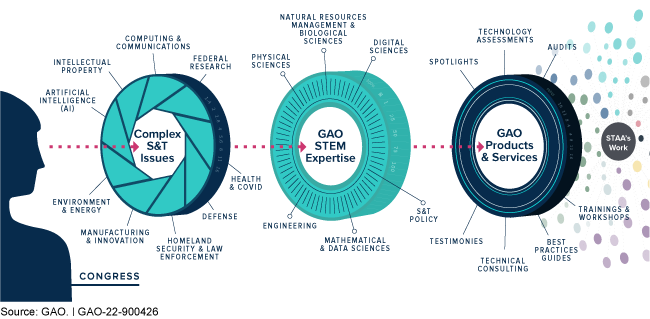Science, Technology Assessment, and Analytics at GAO: September 2022 Update
Fast Facts
From smartphones to bioengineered vaccines, scientific and technological advances are changing the world we live in. Adopting these technologies into every day and government use can bring opportunities—for economic growth and improved quality of life—as well as the potential for unintended consequences.
Since 2019, our Science, Technology Assessment, and Analytics team has provided Congress with in-depth information on the most pressing science and technology issues. Over the next year, we will focus on more issues impacting our nation, such as emerging infectious diseases, artificial intelligence, and the manufacturing supply chain.

Highlights
STAA by the Numbers
STAA's interdisciplinary STEM expertise provides Congress with timely and relevant analysis of complex science & technology (S&T) issues. Since the team's founding in 2019 it has...
- Issued 46 foresight-oriented assessments and short-form explainers on S&T issues
- Testified 10 times on S&T issues and provided S&T support for 25 other GAO S&T-related testimonies
- Issued 28 audit reports with 147 recommendations, 36 of which agencies have implemented
- Provided engineering sciences insight for 78 GAO reports
- Worked with 23 Congressional committees
- Leveraged expertise of 280 leading experts in 19 of our technology assessments
- Collaborated on 2 jointly-issued reports with the National Academy of Medicine, with another in progress
- Spoke at more than 420 external events
- Grew staff from 49 people in fiscal year 2019 to 129 people in July 2022
- Staff collectively hold 100 advanced STEM-related degrees, including 32 PhDs as of July 2022.
STAA Key Milestones
- Pre-2019: GAO issued technology assessments for nearly two decades.
- 2019: STAA established and began to expand. First joint report issued with the National Academy of Medicine. First STAA testimony on S&T issues. Innovation Lab founded.
- 2020: First Polaris Council annual meeting. First joint S&T report with another GAO team. Innovation Lab staffed.
- 2021: Artificial Intelligence Accountability Framework issued. Team reaches 116 staff.
- 2022: Improper Payment Integrity Simulator deployed. Team expects to reach 149 staff by September 2022.
- 2023: Continue collaboration with the Organisation for Economic Co-operation and Development to support technology assessment. Team expects to reach 165 staff.
STAA's Plans
Looking to fiscal year 2023, we will focus on a number of S&T issues that will impact our nation. Forthcoming work includes emerging infectious diseases; artificial intelligence applications; nutritional science and equity; energy, environment, and transportation; U.S. manufacturing and supply chain; national research policy, security, and evaluations; and national and homeland security S&T capabilities.
We will also continue to provide innovative ways to more efficiently and effectively communicate with Congress and the federal S&T community through just-in-time technical consultations and externally focused writing or speaking events.
For more information, contact Timothy Persons at personst@gao.gov and John Neumann at neumannj@gao.gov.
